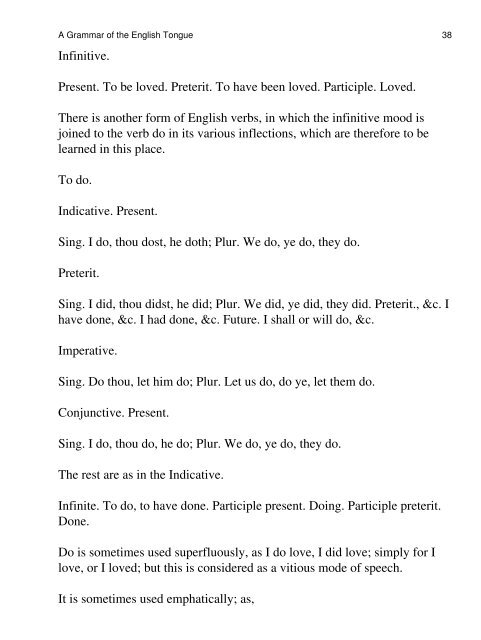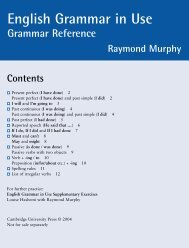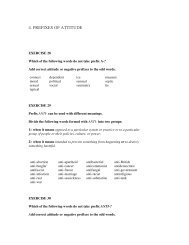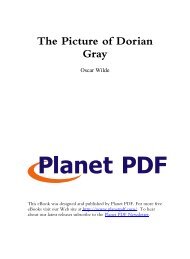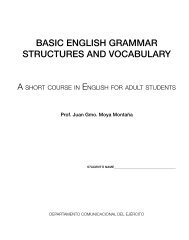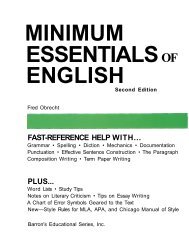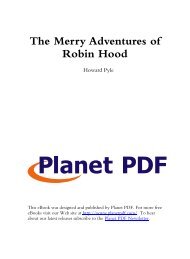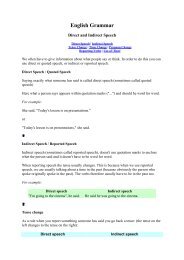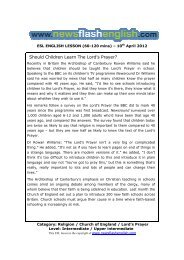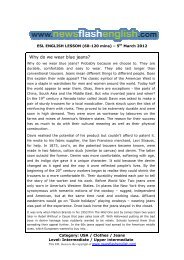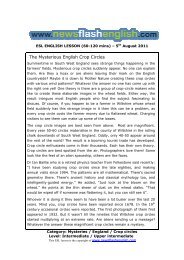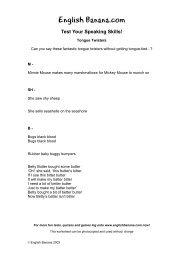A <strong>Grammar</strong> <strong>of</strong> <strong>the</strong> <strong>English</strong> <strong>Tongue</strong> 38Infinitive.Present. To be loved. Preterit. To have been loved. Participle. Loved.There is ano<strong>the</strong>r form <strong>of</strong> <strong>English</strong> verbs, in which <strong>the</strong> infinitive mood isjoined to <strong>the</strong> verb do in its various inflections, which are <strong>the</strong>refore to belearned in this place.To do.Indicative. Present.Sing. I do, thou dost, he doth; Plur. We do, ye do, <strong>the</strong>y do.Preterit.Sing. I did, thou didst, he did; Plur. We did, ye did, <strong>the</strong>y did. Preterit., &c. Ihave done, &c. I had done, &c. Future. I shall or will do, &c.Imperative.Sing. Do thou, let him do; Plur. Let us do, do ye, let <strong>the</strong>m do.Conjunctive. Present.Sing. I do, thou do, he do; Plur. We do, ye do, <strong>the</strong>y do.The rest are as in <strong>the</strong> Indicative.Infinite. To do, to have done. Participle present. Doing. Participle preterit.Done.Do is sometimes used superfluously, as I do love, I did love; simply for Ilove, or I loved; but this is considered as a vitious mode <strong>of</strong> speech.It is sometimes used emphatically; as,
A <strong>Grammar</strong> <strong>of</strong> <strong>the</strong> <strong>English</strong> <strong>Tongue</strong> 39I do love <strong>the</strong>e, and when I love <strong>the</strong>e not, Chaos is come again. Shakespeare.It is frequently joined with a negative; as, I like her, but I do not love her; Iwished him success, but did not help him. This, by custom at least, appearsmore easy than <strong>the</strong> o<strong>the</strong>r form <strong>of</strong> expressing <strong>the</strong> same sense by a negativeadverb after <strong>the</strong> verb, I like her, but love her not.The imperative prohibitory is seldom applied in <strong>the</strong> second person, at leastin prose, without <strong>the</strong> word do; as, Stop him, but do not hurt him; Praisebeauty, but do not dote on it.Its chief use is in interrogative forms <strong>of</strong> speech, in which it is used throughall <strong>the</strong> persons; as, Do I live? Dost thou strike me? Do <strong>the</strong>y rebel? Did Icomplain? Didst thou love her? Did she die? So likewise in negativeinterrogations; Do I not yet grieve? Did she not die?Do and did are thus used only for <strong>the</strong> present and simple preterit.There is ano<strong>the</strong>r manner <strong>of</strong> conjugating neuter verbs, which, when it isused, may not improperly denominate <strong>the</strong>m neuter passives, as <strong>the</strong>y areinflected according to <strong>the</strong> passive form by <strong>the</strong> help <strong>of</strong> <strong>the</strong> verb substantiveto be. They answer nearly to <strong>the</strong> reciprocal verbs in French; as, I am risen,surrexi, Latin; Je me suis levé, French. I was walked out, exieram: Jem'étois promené.In like manner we commonly express <strong>the</strong> present tense; as, I am going, eo. Iam grieving, doleo, She is dying, illa moritur. The tempest is raging, furitprocella. I am pursuing an enemy, hostem insequor. So <strong>the</strong> o<strong>the</strong>r tenses, as,We were walking, [Greek: etynchanomen peripatountes], I have beenwalking, I had been walking, I shall or will be walking.There is ano<strong>the</strong>r manner <strong>of</strong> using <strong>the</strong> active participle, which gives it apassive signification: as, The grammar is now printing, grammatica jamnunc chartis imprimitur. The brass is forging, ara excuduntur. This is, in myopinion, a vitious expression, probably corrupted from a phrase more pure,but now somewhat obsolete: The book is a printing, The brass is a forging;


